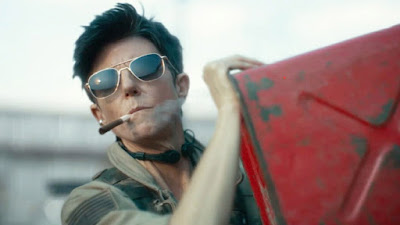“Army of the Dead” starts well, at least, with a jaunty, gory opening credits sequence recounting Sin City as ground zero for zombie apocalypse, its hordes looking very much like a bloodsucking version of the tourist throngs that descend upon Las Vegas near the end of Martin Scorsese’s “Casino.” It’s an inspiring if fleeting flash of satire. Because if this opening suggests a kitschy romp, the tone almost immediately changes when casino owner Tanaka (Hiroyuki Sanada) approaches ex-mercenary Scott Ward (Dave Bautista) about breaking into the walled off city to abscond with the plethora of cash sealed inside Tanaka’s own obligatorily uncrackable vault before the American government obliterates Vegas and its undead population with a 4th of July nuclear strike. Snyder recounts these moments not with an “Aliens”-ish yippee ki ay energy but a conspicuous somberness, underlined in Scott’s estrangement from his daughter Kate (Ella Purnell) over having been forced to kill his wife, Kate’s mother, when she becomes infected. The funereal rendering of this in flashback is a long way from, say, “Zombieland” which deftly melded goofy and grave.
That sort of tonal balancing act almost entirely escapes Snyder, lurching back and forth between breezy and solemn while tacking on myriad cumbersome subplots. Scott not only gets an estranged daughter, he gets an ex-girlfriend (Ana de la Reguera), and each storyline follows virtually the same outline and builds to virtually the same climax.. There are so many subplots that the centering heist plot loses any sense of urgency. Even when the nuclear strike is moved up, meaning the characters will be incinerated in, like, 20 minutes if they don’t get a move on, “Army of the Dead” doesn’t get a move on at all. It’s supposed to be on a clock but Snyder just keeps hitting snooze.
Scott’s team sneaks into Vegas by following Lily (Nora Arnezeder), a so-called coyote, one of Snyder’s many lunges at topicality. Indeed, the quarantined camp outside the city’s wall can be read as akin, maybe, to internment camps at the Mexican-American border or, perhaps, in relation to the COVID-19 Pandemic where temperature guns are wielded like weapons that can make or break you. Either/or/both, it doesn’t really matter. Like that Brazile/Spicer clip, Snyder specializes in a choose-your-own-metaphors absent any conviction. Like the casino towers named Sodom and Gomorra, “Army of the Dead” doesn’t really have anything to say but wants to seem like he has something to say. This is true even of the zombies, some of which are Alphas, intelligent and capable of organization, virtually human in a sense, suggesting unexpected empathy, though that threatens to put a crimp in the all-important zombie killing so the other sect of zombies are old school, mindless shamblers, just there to get chopped up and shot to smithereens. Cover all your bases!
A zombie movie, of course, should have no problem dispatching zombies; that’s why we’re here! But even there Snyder too frequently displays a lack of imagination, never utilizing the Vegas setting like he does in that prologue, the crutch of CGI, as it so often does, hindering a more practical kind of inventiveness. (With each passing movies these days, the more I find myself thinking about the mall scene in “Commando.”) The closest he gets to blending the two is the CGI tiger, a mauling more memorable than the bear mauling in “The Revenant”, frankly, because rather than trying to effuse some sense of violent vanity, it’s just frivolously grotesque. So, too, does the vault break-in inspire as an homage to “Indiana Jones” booby traps where the safecracker, Ludwig (Matthias Schweighöfer), and his cohort Vanderohe (Omari Hardwick) deploy an un-alpha zombie as test bait.
Though Hardwick and Schweighöfer achieve a delightful kind of Odd Couple chemistry, better certainly than Bautista and de la Reguera’s, there really aren’t any standout characters or performances, no one able to invest their archetypes either with fresh-feeling zest or unexpected depth. All, that is, except for Tig Notaro as Marianne Peters, helicopter getaway pilot. Her odd duck turn, it should be stated, comes with backstory. During actual production, Chris D’Elia played the helicopter pilot role, only to be hit with numerous, disturbing accusations of sexual harassment afterwards, leading Snyder to scrub D’Elia from the role and replace him with Notaro. Because filming had wrapped, her scenes were shot separately and then digitally added. It is not, shall we say, seamless. And while that might be of issue to editing perfectionists, Notaro’s remoted in work winds up working quite well, by which I mean it doesn’t really work well at all. I’ll try to explain.
She’s the comic relief, made to deliver all sorts of humorous lines, some of which are objectively funny (“He spent all his money on that fucking miniature”), many of which skew more toward action movie cliche. And while Notaro generally always speaks in deadpan, it’s a different kind of deadpan here, detached, out to sea. That might have been nothing more than Notaro reading her lines to no one. Whatever it is, though, conscious choice or not, it works extraordinarily well, not so much pitched in the vein of irony as in the vein of nothing at all. She manages to drain all the platitudinous applesauce from every line and leave those lines splayed on the ground, betraying their original nothingness, a sensation rhyming with her physical and emotional distance from every character around her. How many times have you seen a movie like this and seen one performance and said, “They’re in a totally different movie.” Notaro really is.





No comments:
Post a Comment